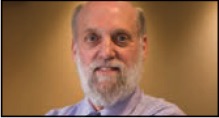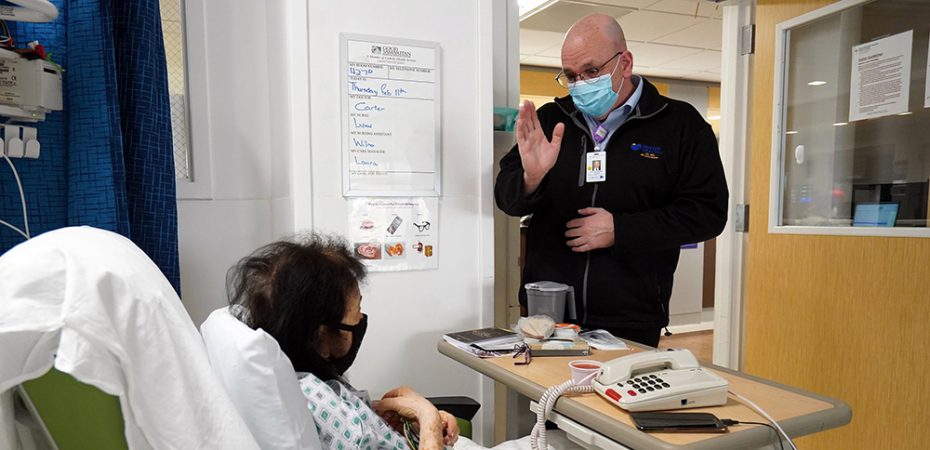The Eucharist and Hospital Chaplaincy
Making the Eucharist the source and summit of encounters with Christ the Servant
Deacon Rodger Accardi Comments Off on The Eucharist and Hospital Chaplaincy
 When I was in grade school, I became an altar server. My relationship with the Eucharist could be described as “guardian of the sacred mysteries.” Preparing the priest’s vestments before Mass, cleansing the vessels after Mass and serving at the altar during Mass had a profound impact on me and influenced my decision to attend high school seminary. The bonding that occurred with high school classmates discerning a vocation to the priesthood was powerful.
When I was in grade school, I became an altar server. My relationship with the Eucharist could be described as “guardian of the sacred mysteries.” Preparing the priest’s vestments before Mass, cleansing the vessels after Mass and serving at the altar during Mass had a profound impact on me and influenced my decision to attend high school seminary. The bonding that occurred with high school classmates discerning a vocation to the priesthood was powerful.
My relationship with the Eucharist could be described as agape with an intimate community. From homerooms to classes, academics to extracurricular activities, prayer services to retreats, a profound sense of belonging to a core community was epitomized at liturgy.
Throughout college seminary, the focus shifted to the wider world of the plight of the city, country and the global community. Many of us were involved in apostolates in parishes, as well as throughout the broader community. In my case, I needed to contribute to my tuition responsibilities, which I accomplished by working as an emergency room orderly at an inner-city hospital. I would leave the seminary in my uniform of white shirt and pants, white shoes and socks. Oftentimes, I returned in the evening with bloodstains splattered over my clothes.
For theology class, I read Jewish texts depicting priests wading up to their knees in blood from animals being slaughtered on the altar of the temple. On television, I watched blood being shed throughout the city, country and the world.
As someone working directly with the sick, the poor and the needy, my relationship with the Eucharist could be described as serving at the table of sacrifice while listening to the cries of the poor in service of the Suffering Servant.
After graduating from college seminary, I was drawn to hospital ministry as a chaplain, and later to seek certification as a Clinical Pastoral Education Supervisor. I was inspired by Anton Boisen, considered the father of the Clinical Pastoral Education movement.
Henri Nouwen was heavily influenced by the hospital chaplain Boisen, the subject of his second doctoral thesis for an advanced theology degree, which influenced his concept of ministers as “wounded healers.” The central tenet of Boisen’s thought was that the persons we serve are “living human documents” on which spiritually significant experiences of life are written.
As a board-certified chaplain and ordained deacon, when I hold the Book of the Gospels and proclaim the Good News, I also hold and proclaim the good news of the living human documents I serve at the bedside. And when I come alongside the patients I serve, I also encounter the Body of Christ who I serve at the altar of sacrifice. I am in harmony with the sacred mysteries proclaimed in these words posted by Father Ron Rolheiser in an article titled “A Eucharistic Prayer Over An awakening World in which he quotes French Jesuit priest Father Pierre Teilhard de Chardin (1881-1955): “On my paten, I hold all who will live this day in vitality, the young, the strong, the healthy, the joy-filled; and in my chalice, I hold all that will be crushed and broken today as that vitality draws its life. I offer you on this all-embracing altar everything that is in our world, everything that is rising and everything that is dying, and ask you to bless it.”
The Eucharist is the source and summit of my encounters with Christ the Servant on the altar and at the bedside. The Word proclaimed at liturgy is directly related to the word encountered in each living human document. Like all significant relationships, my relationship with the Eucharist has changed through the years: constancy amidst an ever-deepening and broadening of that relationship.
DEACON RODGER ACCARDI, a deacon of the Diocese of Joliet, holds a doctorate of ministry and is a chaplain internship supervisor and director of spiritual care at Northwestern Medicine Central DuPage and Delnor hospitals.





